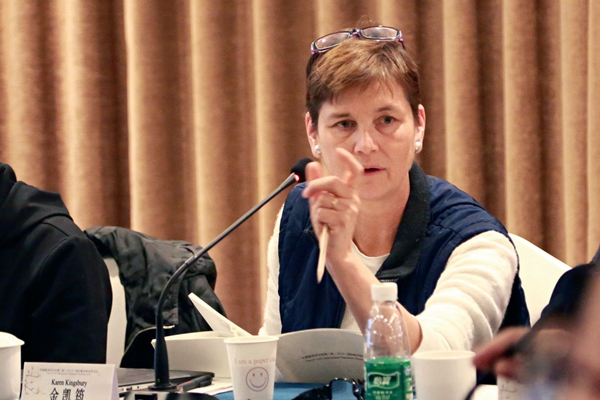Literature transcends national boundaries: Chinese writing in translation
- By staff reporter Liu Yi
 0 Comment(s)
0 Comment(s) Print
Print E-mail China Today, June 27, 2017
E-mail China Today, June 27, 2017
Looking for the Next Eileen Chang
When asked why she translated Chang's novels, Kingsbury replied, "My goal was to find great Chinese writers." Kingsbury started to learn Chinese in her 20s. At that time, she had just graduated from university with a degree in English Literature. She then chose to teach English in Sichuan, southwestern China. "There were only about 20 foreigners in the college, including foreign teachers and their families," Professor Kingsbury recalled, "so I started to learn Chinese."
|
Professor Karen S. Kingsbury holds that translators play a key role in bridging the linguistic and cultural gaps between writers and readers of different nationalities. |
In the early 1990s she studied Comparative Literature at Columbia University with Professor Xia Zhiqing and Professor Wang Dewei, leading lights in contemporary Chinese literature research. Eileen Chang became well-known in the U.S. only after her novella Lust, Caution was adapted for the screen by Academy Award-winning director Ang Lee in 2007. Back in the 1990s, her name remained relatively unknown for several reasons.
"I deeply believe that Eileen Chang is a great writer, as good as Lu Xun, Leo Tolstoy, and Virginia Woolf," said Kingsbury, "so I want to do my best to bridge the gap of language and culture."
Kingsbury believes Eileen Chang's background in bilingual education is one factor contributing to her appeal in the West. "In her early years, Chang didn't write fiction for English readers, but her multicultural background helped her think like English-speaking people."
"Writers who have a profound understanding of foreign cultures are able to ‘adjust' their works for foreign readers." Kingsbury explained that this "adjustment" means that the writers can think of various cultures and social backgrounds while writing, whether they do so intentionally or unconsciously. She gave a more recent example of Japanese writer Murakami Haruki. "He is very popular in the U.S., as he knows what English readers like to read," Kingsbury said.
Kingsbury noted that love and life are topics that could arouse the widest interest amongst readers. Many Americans are curious about how Chinese society operates, how Chinese people live, and what they think of religion and life.
"But personal interest and social trends also influence readers' decisions. For instance, my students pay special attention to women's issues," Professor Kingsbury said. Chatham University, where she teaches, was until recently a women's college, one of the oldest and most eminent in the Midwest. "They want to know how Chinese see gender differences, and how different genders see life."
Nowadays, there are multiple channels through which people can access Chinese literature thanks to advances in telecommunications. Professor Kingsbury gave a particular mention to "Paper Republic," a platform for literature in translation founded in 2007. Since going into cooperation with Beijing-based People's Literature in 2011, the website has gathered together a group of writers, works of literature and translators. "Many American publishers visit the website for publishing ideas," Kingsbury said, "as the U.S. market is looking for more outstanding Chinese literature."







Go to Forum >>0 Comment(s)